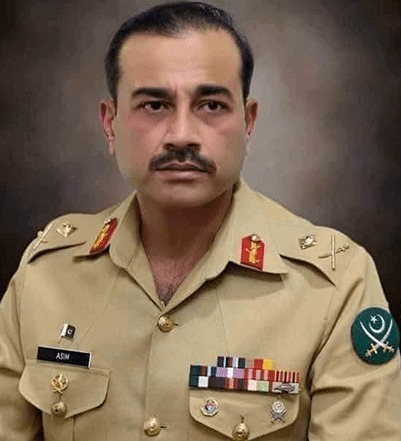Islamabad: Pakistan’s former spy master and senior-most Lt General Asim Munir was named as the new Army Chief by Prime Minister Shehbaz Sharif on Thursday, ending speculation over the most powerful position in the coup-prone nation, where the military wields considerable power in matters of security and foreign policy.
Lt Gen Munir has served as chief of two most powerful intelligence agencies—the Inter-Services Intelligence (ISI) and the Military Intelligence (MI) — but his stint as the spy chief at the ISI was the shortest ever as he was replaced by Lt Gen Faiz Hamid within eight months on the insistence of then-Prime Minister Imran Khan in 2019.
He would replace Gen Qamar Javed Bajwa, who retires on November 29 after two consecutive three-year terms. Gen Bajwa, 61, was appointed as the army chief in 2016 for a three-year term. He was given a three-year extension by the Khan government in 2019.
Information Minister Marriyum Aurangzeb announced on Twitter that Prime Minister Sharif has named Lt Gen Munir as the new army chief. Lt Gen Sahir Shamshad Mirza had been picked as the Chairman of the Joint Chiefs of Staff Committee (CJCSC).
“The summary about (appointments) has been sent to the President,” Marriyum Aurangzeb tweeted.
Both officers have also been promoted to four-star generals.
The CJCSC is the highest authority in the hierarchy of the armed forces but the key powers including mobilisation of troops, appointments and transfers lie with the COAS which makes the person holding the post the most powerful in the military.
The powerful Army, which has ruled Pakistan for more than half of its 75-plus years of existence, has hitherto wielded considerable power in matters of security and foreign policy.
The Pakistan Tehreek-e-Insaf party earlier quoted Imran Khan as saying that “when the summary comes, I and the President of Pakistan will act according to the constitution and laws.”
The appointment coincides with a dispute between the military and Imran Khan, who blames the army for playing a role in his ouster in April this year through a no-confidence vote.
Khan’s close aide and former information minister Fawad Chaudhry said on Wednesday that “until we see the conduct of the new army chief, we cannot say anything about it, but the role of the army in politics in the last 6 months is controversial, this role will need to be changed.”
Lt Gen Munir is the senior-most general. Although he was promoted to the rank of two-star general in September 2018, he took charge two months later. As a result, his four-year tenure as Lt Gen will end on November 27. But with his appointment as COAS, he would get a three-year extension in the service.
He was commissioned into the Frontier Force Regiment and has been a close aide of the incumbent COAS ever since he commanded troops in the Force Command Northern Areas as a brigadier under Gen Bajwa, who was then the Commander X Corps.
Munir was later appointed chief of Military Intelligence in early 2017, and in October next year was made the ISI chief. He was then posted as Gujranwala Corps commander, a position he held for two years, before being moved to the GHQ as Quartermaster General.
Lt-Gen Mirza, who hails from the Sindh Regiment, has had an impressive career in the army, particularly in senior leadership positions during the past seven years.
He came to prominence as director-general military operations (DGMO) during the last two years of Gen Raheel Sharif, the COAS from 2013-16. In that role, he was part of Gen Sharif’s core team at GHQ, which supervised the military operation against the Tehreek-i-Taliban Pakistan (TTP) and other militants in North Waziristan.
Further, he was closely involved in the Quadrilateral Coordination Group (QCG) that brokered intra-Afghan talks involving Pakistan, China, Afghanistan and the United States. Besides, he was also a member of the Sartaj Aziz-led committee on reforms for Gilgit-Baltistan.
After his promotion to the three-star rank, he was appointed chief of general staff, effectively making him the second-most powerful person in the army after the COAS. In that role, he was closely engaged in crucial decision-making related to national security and foreign affairs. He also joined former foreign minister Shah Mehmood Qureshi in strategic talks with Chinese Foreign Minister Wang Yi in 2021.
In October 2021, he was posted as Corps Commander Rawalpindi to enable him to acquire operational experience and become eligible to be considered for the top posts.
Meanwhile, Defence Minister Khawaja Asif told the media after the appointments that the “advice” had been forwarded to President Arif Alvi, adding that all matters had been settled according to the law and the Constitution.
He called on citizens to refrain from viewing it through a “political lens,” Dawn newspaper reported.
He hoped that the President would not make the appointments “controversial” and would endorse the advice of the premier.
The defence minister reiterated that the President should endorse the premier’s advice so that a “controversy may not arise”.
“This will also help our country and the economy to get on track. Currently, everything is at a standstill.” There has been extraordinary interest in the appointment of Bajwa’s successor as many believe ousted prime minister Khan’s long march is linked to the change of command in the Army.
He has asked his supporters to gather in Rawalpindi on November 26, two days before Gen Bajwa hands over the baton to the new Army chief.
The high drama around the key appointment has not gone unnoticed around the world as the army chief of a nuclear army, which is also one of the biggest, of the sixth biggest strategically placed country, when it is also facing political turmoil and economic meltdown, is by no means an ordinary affair.


